Maia Davies & Dearbail Jordan

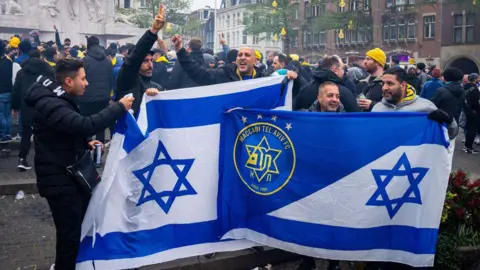 AFP via Getty Images
AFP via Getty Images
Maccabi Tel Aviv football fans in Amsterdam in November
The Home Office was told last week that a ban on Maccabi Tel Aviv fans attending a football match in Birmingham was being considered, a police unit has said.
On Thursday, Aston Villa said the city's Safety Advisory Group (SAG) - which advises the council on whether to issue safety certificates - decided that fans of the Israeli club should not be permitted to attend the Europa League fixture on 6 November.
The Home Office had been briefed that restrictions on visiting fans might be imposed, but the BBC understands officials were not informed about the final decision.
Authorities are facing mounting pressure to resolve the situation and the government said earlier on Friday that talks were happening "at pace" to overturn the ban.
Sir Keir Starmer called the move to block fans attending "wrong", adding "we will "not tolerate antisemitism on our streets", while there has also been criticism from other party leaders.
Downing Street said the Home Office was "urgently working to support police to try and find a way through this" and Culture, Media and Sport Secretary Lisa Nandy was meeting officials.
The SAG will review the decision if West Midlands Police changes its risk assessment for the match, Birmingham City Council said.
On Thursday, West Midlands Police said it had classified the fixture as "high risk" based on current intelligence and previous incidents, including "violent clashes and hate crime offences" between Ajax and Maccabi Tel Aviv fans before a match in Amsterdam in November 2024.
More than 60 people were arrested over the violence, which city officials described as a "toxic combination of antisemitism, hooliganism, and anger" over the war in Gaza, Israel and elsewhere in the Middle East.
The Culture, Media and Sport Committee in Parliament has called on West Midlands Police to explain why it does not believe it can safely police next month's match without the ban.
In a letter to the force's chief constable, committee chair Dame Caroline Dinenage MP said the decision was "extremely concerning" and "at odds with the principle that football in this country is for everyone."
Senior officers at the UK Football Policing Unit - which advises on security at matches across the country - backed the ban, and said it was "important that we respect and support the structures in place for making these decisions".
The unit added that the Home Office had been "briefed last week" about "potential issues" with visiting fans and the possibility that restrictions might be imposed.
Conservative leader Kemi Badenoch said the revelation left the Home Secretary, Shabana Mahmood, with "serious questions to answer" about why her department did "nothing" to avert the ban.
She said: "This is a weak government that fails to act when required."
A source close to Mahmood told the BBC that "this is categorically untrue".
"The first time the home secretary knew that the fans were being banned was last night," they added.
Downing Street said blocking supporters from attending was an "operational decision" made by local authorities and said Nandy was in discussions about "what more can be done to allow fans to attend the game safely".
Simon Foster, West Midlands' police and crime commissioner, said he has asked the Safety Advisory Group and the police to "conduct an immediate review of the decision" to determine whether it was justified.

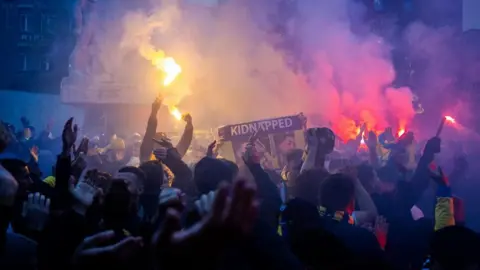 Shuttershock
Shuttershock
Maccabi Tel Aviv supporters gather ahead of last year's match with Ajax in Amsterdam
Aston Villa said it was in "continuous dialogue with Maccabi Tel Aviv and the local authorities," with the safety of supporters and local residents "at the forefront of any decision".
Jack Angelides, chief executive at Maccabi Tel Aviv, said the decision to block fans had been "met with some dismay about what this is potentially signalling".
Football's European governing body Uefa said it wanted fans to be able to travel and support their team in a "safe, secure and welcoming environment" but local authorities remained responsible for safety and security decisions.
Chaired by Birmingham City Council's head of resilience, the Safety Advisory Group is made up of officials from the local authority, emergency responders - including the police - and event organisers.
According to the council website, its role is to offer advice and guidance regarding public health and safety at events, including to "reduce any negative impact", but it isn't able to approve or reject them.
The power to issue safety certificates, which can come with conditions, ultimately lies with local councils. It is illegal for sporting events to go ahead without one in grounds with more than 10,000 spectators.
A Birmingham City Council spokesperson said a meeting had been held with "all relevant partners to assess safety arrangements" for the fixture.
"Following a thorough review, concerns were raised regarding public safety if away fans attend the match, by the police," they added. "As a result, a collective decision was made to restrict away fan attendance."
Ayoub Khan, an independent MP for Birmingham Perry Barr who campaigned on a pro-Gaza platform in last year's general election, had pushed for the match to be cancelled due to safety concerns and welcomed Thursday's decision.
He told BBC Newsnight the prime minister "should stay out of operational matters" and leave it to local authorities.
Khan added: "Nobody should tolerate antisemitism - we all condemned what happened in Manchester, that was clearly antisemitic," referring to the deadly synagogue attack earlier this month.
"But we cannot conflate antisemitism when we look at what some of these fans did in Amsterdam in 2024. The vile chants of racism and hatred, the chants that there are no schools left in Gaza because there are no children left in Gaza."
Andrew Fox, honorary president of Aston Villa's Jewish Villans supporters' club, said he thought Khan's comments on Amsterdam were "shameful", describing what happened there as a "premeditated Jew hunt".
Emily Damari, a British-Israeli citizen who was held hostage in Gaza and released in January, said she was "shocked to my core with this outrageous decision".
Ms Damari, who described herself as as "die-hard fan of Maccabi Tel Aviv", said: "Football is a way of bringing people together irrespective of their faith, colour or religion and this disgusting decision does the exact opposite."

 Ziv Koren
Ziv Koren
Maccabi Tel Aviv fan and ex-hostage Emily Damari called the decision "outrageous"
The decision was also criticised by the Liberal Democrats and Reform UK, as well as Israeli government officials.
The Green Party backed the decision and said it was "irresponsible" for Starmer to question a local authority's safety decision.
Green deputy leader Mothin Ali, said: "These games are taking place in the context of thousands of civilians being killed in Gaza, the illegal occupation of Palestinian land, and the upholding of a system of apartheid."
Various sporting events have seen protests over the war in Gaza, including when Israel's national team played Norway and Italy in recent World Cup qualifiers.
Earlier this month, 22 people were arrested near the Ullevaal Stadium in Oslo. Reports said tear gas was used after several demonstrators broke through police barriers.
A few evenings later, Israel's national team played its next qualifier against Italy in the northern city of Udine, where an estimated 5,000 protesters took part in a march ahead of the game. Clashes with police broke out there too, with a number of people arrested.
There was also a protest in Spain on Wednesday over Euroleague's basketball game between Valencia and Hapoel Tel Aviv, in which several people were arrested.

 4 hours ago
9
4 hours ago
9




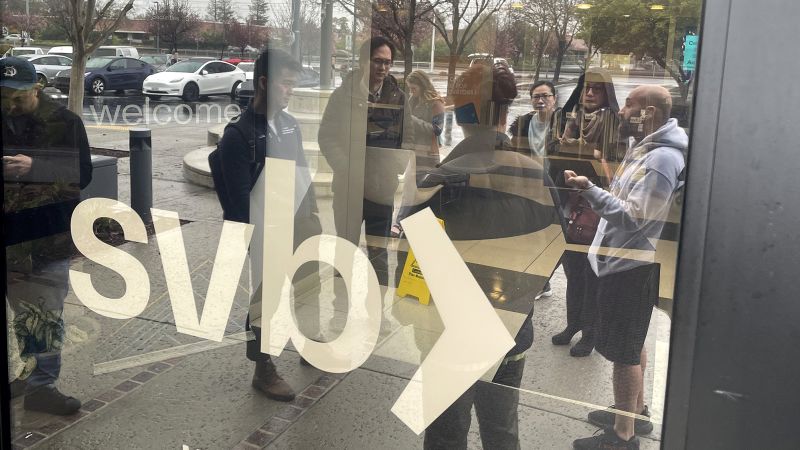

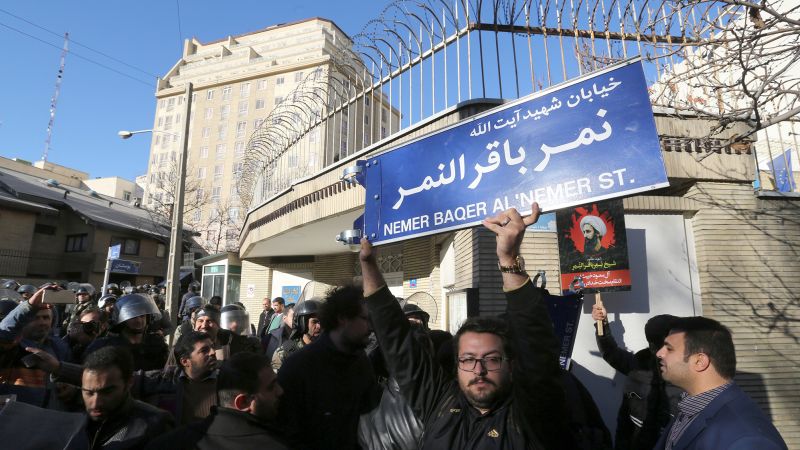
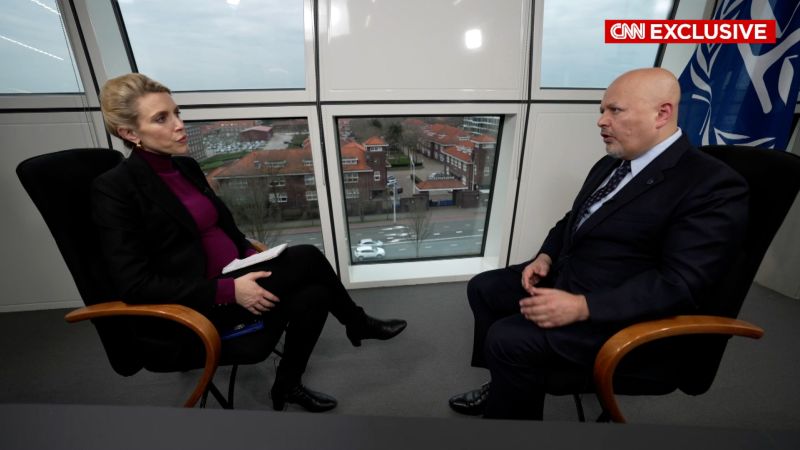
 English (US)
English (US)